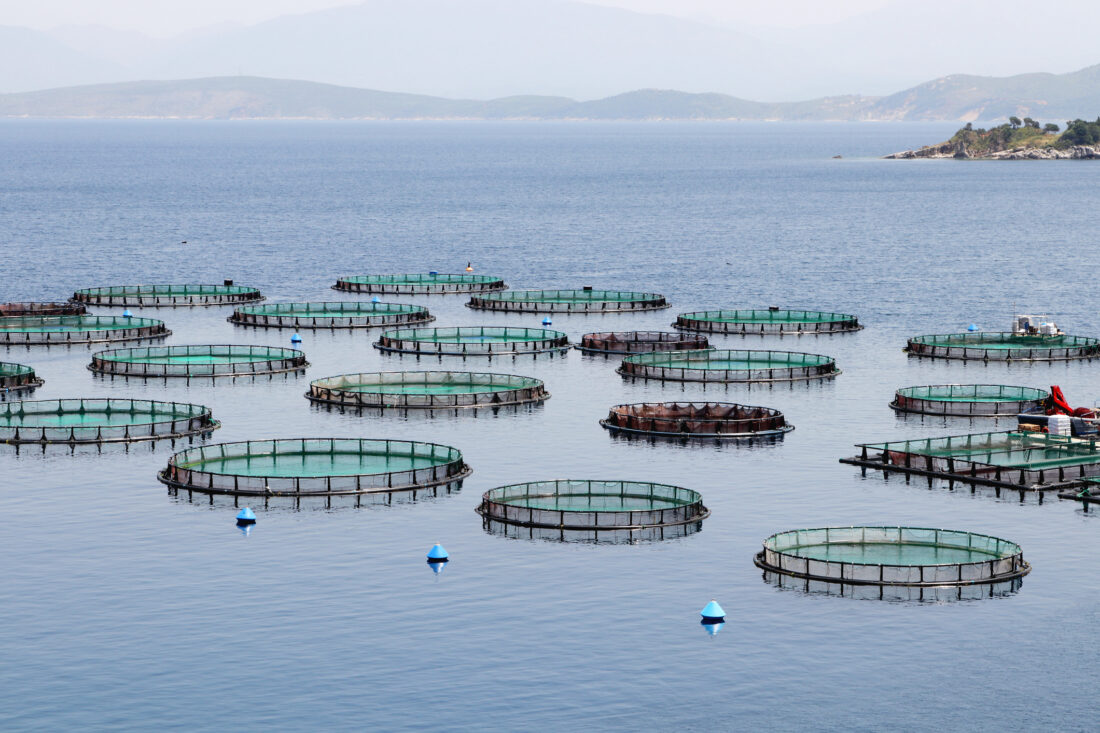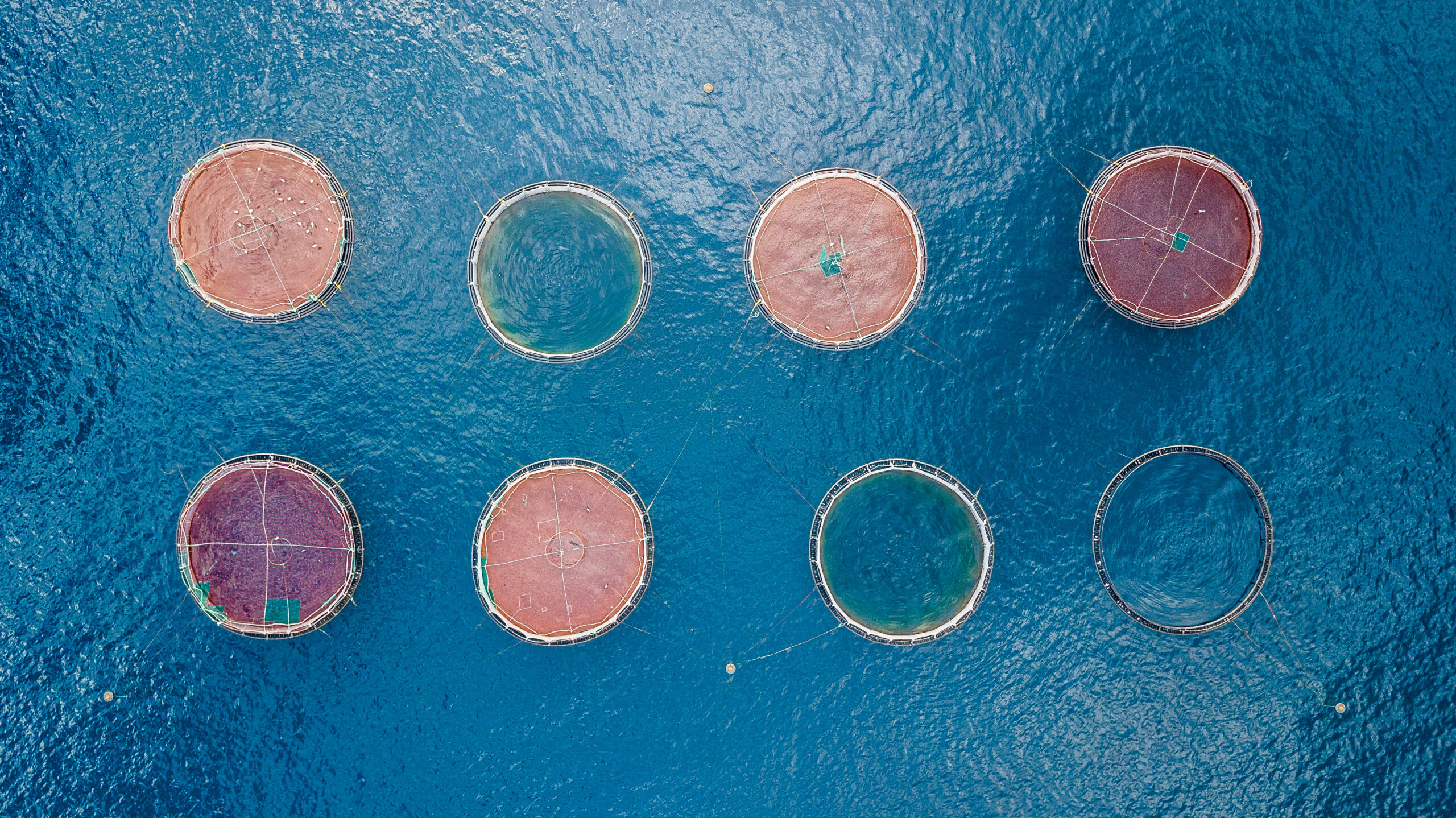
Aquaculture’s Big Catch: Corporate Control
By Skye Walker
Legal Fellow
Nothing better illustrates the grim transformation of U.S. aquaculture than Maine’s Cobscook Bay. In the 1970s, local families in the bay employed local workers at smaller-scale salmon farms of 3-4 net pens each, and feed manufacturers harvested fewer wild fish by using leftover cuttings from local sardine canners.
By the late 1990s, three foreign companies had bought up the smaller ones and began overstocking the net pens, resulting in a disease outbreak and the culling of two million salmon. Shortly after, the foreign companies sold out to Canadian giant Cooke Aquaculture, a multinational business that leases Maine’s public waters without contest. On November 14, 2024, Conservation Law Foundation notified Cooke of its intent to sue for Clean Water Act violations at 13 of its leased sites.
While aquaculture has the potential to bring value to coastal communities, economies, and food systems, the industrial model is in dire need of an overhaul.
Following in the footsteps of its close cousin, land-based animal agriculture, aquaculture has become heavily corporatized and consolidated. Multinational food and pharmaceutical businesses like Cargill (one of the “big four” U.S. meatpackers), Merck, and Bayer dominate the market for fish feed, vaccines, antibiotics, and other drugs.
Fish and shellfish farms have become fewer in number and larger in size. Vertical integration, where companies control most or all aquaculture production phases, including processing, is not uncommon. Corporations have a particularly tight grip on salmon farming.
Ever heard of “AquAdvantage”? It’s a genetically modified mix of Chinook salmon, Atlantic salmon, and ocean pout created by a company called AquaBounty. AquAdvantage salmon are raised indoors at AquaBounty’s, land-based facilities, use 25 percent less feed than other farmed salmon, and reach harvest weight in 18 months instead of the standard three years.
Sound familiar? Big Ag companies have done the same with poultry, swine, and cattle, using selective breeding or introducing hormones to rapidly maximize growth or product yield—usually to the animals’ detriment.
In the aquaculture space, a broad coalition including fishers, environmental groups, and indigenous groups such as the Quinault tribe and Muckleshoot Food Sovereignty Project have pushed back on AquaBounty’s genetically engineered salmon, with the Center for Food Safety leading the charge on litigation.
“Someone now owns my ancestral foods’ DNA” said Valerie Segrest (Muckleshoot), a Native foods nutritionist and the Regional Director of Native Food and Knowledge Systems for the Native American Agriculture Fund. “[W]e certainly do not benefit [from GE salmon]. The industrial food system benefits. Some corporation who does not actually care about human or environmental health benefits—greatly.”
You can see Valerie’s full interview here. AquaBounty is not only privatizing a culturally significant public resource that tribes have successfully managed for thousands of years but is reconstructing that resource for financial gain—without regard for the impacts. Many underscore that AquAdvantage is not nutritionally equivalent to wild salmon and could threaten wild salmon more broadly in the event of escape.
The corporatization of U.S. aquaculture is due, in part, to a leasehold system. Leases are common with “nearshore aquaculture,” in which fish and shellfish are grown along shorelines and in bays and estuaries. State governments grant leases of varying size and duration providing aquaculture producers, as de-facto owners, exclusive use of an area.
Sometimes, leaseholders do not live near the location of their facility. Leaseholders can limit the ability of others to use the area and sell their access to other companies at a profit. This arrangement shifts wealth from a public resource into the hands of a few private players.
That is also true of “offshore aquaculture”—the cultivation of aquatic species in state waters (three nautical miles seaward from the coastline) and federal waters (beyond three nautical miles) using fancy tech. An emerging industry in the United States, there are currently six companies with proposed or active marine fish farms in state or federal waters. Far from local “mom and pop” producers, most are out-of-state or multinational entities backed by private equity or venture capital.
In this system, benefits are often not distributed evenly and communities lose out. Larger, out-of-state companies are more likely to lack the cultural awareness and place-based knowledge of local anglers and producers. And both the leases themselves and the ensuing environmental impacts of industrial scale aquaculture can drive out local fishing communities and limit their catches.
For example, in Washington’s North Puget Sound region, Taylor Shellfish Farms has degraded eel grass beds upon which salmon and other species rely for habitat. This has limited the amount of salmon and wild shellfish that Swinomish tribal members can harvest from the eel grass beds.
Sadly, a second Trump Administration is likely to support aquaculture policies that favor corporate consolidation and expansion.
In his first term, Trump issued an executive order to fast-track development and permitting for offshore industrial aquaculture in federal waters. Couched as a path to a “vibrant and competitive seafood industry,” the order props up offshore fish farms that are only financially feasible for the biggest players and have a history of marine pollution. The administration issued a nationwide permit for offshore fish farms in furtherance of Trump’s order. The administration also issued a nationwide permit for industrial shellfish farming and approved thousands of acres of leases along Washington’s coast. These actions prompted a series of lawsuits by the Center for Food Safety, Coalition to Protect Puget Sound, and Swinomish tribe.
The U.S. District Court for the Western District of Washington struck down both permits, holding that the government failed to adequately assess the permits’ environmental impacts and risks.
Decades of advocacy by the Wild Fish Conservancy, tribes, and others also led Washington state to finalize a ban on commercial net pen fish farms in state-owned waters in January of 2025, a move prompted by Cooke Aquaculture’s 2017 net pen failure and the accidental release of 250,000 nonnative Atlantic salmon into the Puget Sound.
FarmSTAND sees close parallels between industrial animal agriculture and industrial aquaculture and understands that a better food system is not possible without dismantling both. We admire the work of groups like the North American Marine Alliance and its partners and allies that are currently pushing for positive change in the industry. Aquaculture that’s sustainable, humane, and owned by independent fishers must be a part of the new food system we’re all working to build.

